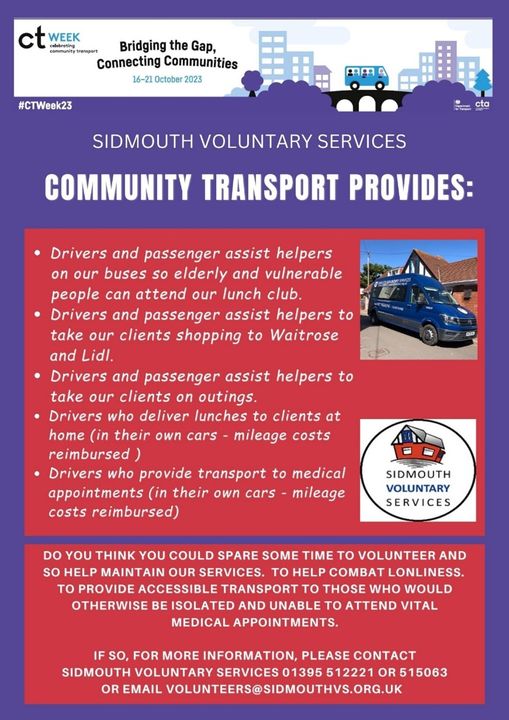“Bridging the Gap: Connecting Communities” [Community Transport Assn]
“This is a time to spotlight the incredible efforts of our volunteers who work tirelessly to provide reliable transportation options for those who face mobility challenges or lack access to conventional modes of transport.” [Sidmouth Voluntary Services]
“People who live in rural areas still need access to a reliable and affordable public transport network.” [Campaign for Better Transport]
.
We’ve just come to the end of Community Transport Week 2023 – as organised and celebrated by the Community Transport Association:
CT has been delivering supported transport for over 57 years in the UK for older people, young people, minority groups, people living with disabilities and anyone who cannot afford public transport… This year’s Community Transport Week themed Bridging the Gap: Connecting Communities will celebrate how accessible, inclusive and affordable transport is fostering stronger and more connected communities.
The Week has been celebrated by Sidmouth Voluntary Services – with great reports coming out every day, including:

Where would we be without our amazing volunteers who did almost 6,000 hours during 2022 and look set to do even more this year! This is a time to spotlight the incredible efforts of our volunteers who work tirelessly to provide reliable transportation options for those who face mobility challenges or lack access to conventional modes of transport.
We have minibus drivers and chaperone helpers who cover the lunch and shopping buses, delivery drivers who take lunch to those who cannot leave the house, medical car drivers using their own car to get patients to and from their medical appointments throughout Devon and our outing drivers and helpers taking clients on trips throughout the year.
With more info from Friends of Twyford about how the service works.
Following the successful Community Transport Week, the Rural Services Network [RSN] asked Kevwe Oghide from the Community Transport Association to explain the impact of their work for rural areas:
In essence, community transport services are a vital and often underappreciated component of the UK’s transport network, offering a lifeline to those who may otherwise face barriers to mobility.
And as part of Community Transport Week, Better Transport has been busting some common myths about transport – and the RSN’s favourite is Myth 4: Public transport doesn’t work in rural areas:
People who live in rural areas still need access to a reliable and affordable public transport network. What that network looks like will be different to what an urban network looks like, but, as areas like Cornwall are proving, it is still achievable. Unfortunately, rural areas have disproportionally missed out on public transport funding in recent years. Our analysis found that in the last decade…
Silviya Barrett, from Campaign for Better Transport, said: “The Government’s policy of asking local authorities to compete for local transport funding is producing the same winners and losers time and again. This shouldn’t be the case. All communities deserve a reliable, regular and affordable bus service. To ensure this happens, the Government must move away from this fragmented and competitive way of funding and replace it with a long-term funding settlement for all transport authorities.”
Read the full set of myths and sort fact from fiction where the Campaign for Better Transport is busting some transport myths:
Myth 1. Not that many people catch the bus any more
Buses are in fact our most used form of public transport, carrying millions of us around the country every single day. What’s more, passenger numbers are now back to the levels seen before the pandemic forced the large-scale closure the bus network...
Myth 2. Flying will get me there more quickly than taking the train
Even in a country the size of the UK, there are a surprising number of domestic flights every year. One of the reasons people often cite for flying within the UK is that is so much quicker than driving or taking the train, except we discovered it isn’t. Once you compare journeys like for like, i.e., the full journey time, not just the ‘flight’ time, travelling by rail within the UK and to the near continent is generally quicker than the equivalent flight. In our ground-breaking report, Plane speaking: Moving journeys from air to rail, we compared the top 23 domestic and UK to Europe flights which all have a direct rail equivalent on cost, journey time and carbon emissions and found that 14 out of the top 20 UK routes (based on passenger numbers) were quicker by train once airport travel and processing times were factored in…
Myth 3. Everyone owns a car
Well in fact, one in five households don’t own a car, rising to a one in three among lower income households…
Myth 4. Public transport doesn’t work in rural areas
People who live in rural areas still need access to a reliable and affordable public transport network…
Myth 5. Building more and bigger roads will help reduce congestion
Road congestion costs the UK economy billions a year and impacts on our health and wellbeing. We cannot build our way out of congestion with more and bigger roads because of a phenomenon called ‘induced traffic’…
…